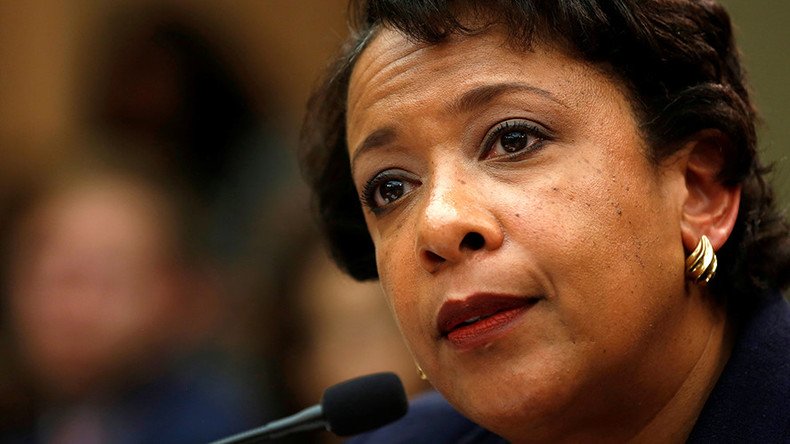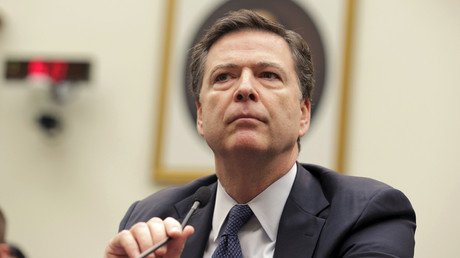AG Lynch stonewalls Congress on Clinton email probe

House Republicans tried in vain to pry any sort of comment on the Department of Justice probe of Hillary Clinton’s email use, with Attorney General Loretta Lynch steadfastly dodging any questions about the FBI chief’s testimony about the case.
FBI Director James Comey appeared before the Government Oversight and Reform committee last week, explaining why the bureau had recommended against prosecuting the former secretary of state or any of her aides for using a private email server to conduct official business – which included the sending and receiving of classified information.
Facing the House Judiciary Oversight Committee on Tuesday, Lynch kept answering Republican members’ inquiries by saying that it would be “inappropriate” of her to “characterize or comment on” Comey’s statements about the case.
Lynch spoke highly of the team of “career lawyers and seasoned agents” at the FBI that made the recommendation not to press charges against Clinton and her staff. When asked to walk the committee through her reasoning in accepting their judgment, however, she declined.
“I’ve committed to accepting the recommendations,” Lynch told Representative Trent Franks (R-Arizona). “It would not be appropriate for me to get into that level of analysis.”
“I’m going to capitulate to your prodigious dissimulation skills,” the visibly frustrated Franks replied, adding that deciding on the prosecution is her job, not that of the FBI.
While Lynch refused to discuss the details of the Clinton investigation, she maintained that the decision to prosecute a case involving improper sharing of classified materials would have to be based on specific facts, on a case-to-case basis.
Jason Chaffetz (R-Utah), who also chairs the Oversight committee, asked a series of questions about the legality of handling classified materials, to which Lynch replied by refusing to discuss hypotheticals and again pointed to the need for specifics of the case.
“Why is the law not sufficient guidance?” Chaffetz asked.
“I don’t have a comment on the state of the law,” Lynch replied.
Answering a series of questions by Trey Gowdy (R-South Carolina), Lynch explained her runaround by saying that the information provided by the FBI team “has to be given in a zone of confidentiality” to ensure the absence of political overtones.
Gowdy retorted that the AG’s refusal to discuss the case only reinforces the public perception of the dual standard for justice in the department’s refusal to penalize Clinton.
GOP to Lynch: "You’re sending a terrible message to the world." https://t.co/NjsfkoEcpZ@remawriterpic.twitter.com/xTzxL9MPUu
— Roll Call (@rollcall) July 12, 2016
Pressed on the meeting with former president Bill Clinton on the plane at Phoenix airport, Lynch maintained it was merely a “social conversation.”
“We did not discuss Ms. Clinton in any way,” Lynch told Rep. Blake Farenthold (R-Texas). Bill Clinton “only wanted to say hello.”
Democratic members of the panel notably refused to ask any questions about the email investigation, asking instead about other issues – from the police killing of African-Americans to immigration raids and alleged profiling of Asian-Americans.
Lynch gave similarly guarded responses to their inquiries as well, at one point rebuffing a question by Jerrold Nadler (D-New York) about the NRA by saying that the shooting of police officers in Dallas “doesn’t lend itself to aphorisms.”
Smith: Do you believe she violated FRA?
— emptywheel (@emptywheel) July 12, 2016
Lynch: Not under purview of investigation.
This is why GOP referral for perjury will have legs.
On Monday, Chaffetz and the Judiciary Committee chairman Bob Goodlatte (R-Virginia) requested the US Attorney for the District of Columbia open an investigation on whether Hillary Clinton committed perjury and “made false statements when testifying under oath before Congress.”
Clinton’s statements in Congress were not considered by the FBI, director Comey said last week, because the bureau did not receive the appropriate referral from the legislators.













